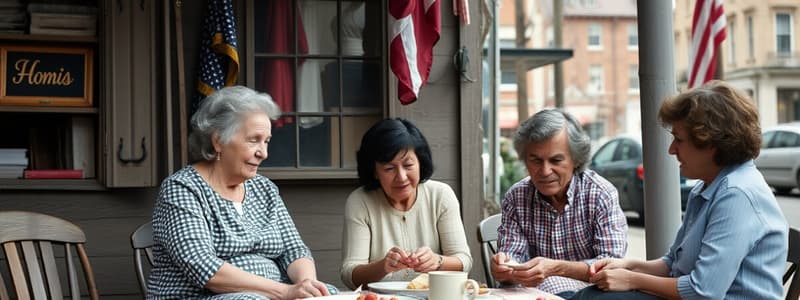Podcast
Questions and Answers
What does the term 'urban middle class' refer to?
What does the term 'urban middle class' refer to?
- Slaves and their masters
- Professionals, businessmen, and traders in the market economy (correct)
- Rural communities in the antebellum south
- Farmers who own their land
What is the 'cult of domesticity'?
What is the 'cult of domesticity'?
An idealized view of the family characterized as selfless and cooperative.
What did Catherine and Mary Beecher establish?
What did Catherine and Mary Beecher establish?
Hartford Female Seminary
Louisa May Alcott wrote _____ and sought independence for herself.
Louisa May Alcott wrote _____ and sought independence for herself.
What was Castle Garden?
What was Castle Garden?
What does 'black nationalism' emphasize?
What does 'black nationalism' emphasize?
What was the purpose of the Negro Convention Movement?
What was the purpose of the Negro Convention Movement?
Who are yeoman farmers?
Who are yeoman farmers?
What characterized the antebellum south?
What characterized the antebellum south?
What was southern paternalism?
What was southern paternalism?
What does the term 'slave-master relationship' imply?
What does the term 'slave-master relationship' imply?
What is 'slave culture'?
What is 'slave culture'?
Who was Denmark Vesey?
Who was Denmark Vesey?
What did Nat Turner do?
What did Nat Turner do?
Flashcards are hidden until you start studying
Study Notes
Urban Middle Class
- Consisted of professionals, businessmen, and traders thriving in the market economy.
- Represented a distinct emergence of the middle class during this period.
- Family life centered around large homes filled with new consumer products.
Cult of Domesticity
- Presented an idealized view of family life, emphasizing selflessness and stability.
- Promoted traditional values, positioning the arts as the "women's sphere."
- Women were expected to master domestic arts to uphold this ideal.
Catherine and Mary Beecher
- Founded Hartford Female Seminary, breaking ground for women's education.
- Offered a curriculum that included history and science, alongside traditional subjects.
- Pioneered educational opportunities for women beyond domestic skills.
Louisa May Alcott
- Authored "Little Women," advocating for women's independence and financial autonomy.
- Chose to remain unmarried, pursuing a career instead of conforming to societal expectations.
- Represented a shift in women's roles, as most women of the time prioritized marriage.
Castle Garden
- Served as an immigrant center in New York, aiding newcomers in settling down.
- Provided assistance with travel plans and integration into American society.
- Highlighted the need for support systems for immigrants during this era.
Black Nationalism
- Free people of color established their own communities and self-governing institutions.
- Emphasized racial solidarity and self-help, alongside a growing interest in Africa.
- Reflected a desire for independence and self-determination among African Americans.
Negro Convention Movement
- Organized national conventions aimed at self-defense and activism against slavery.
- Functioned as a platform for discussing equal rights and strategies for reform.
- Marked the first organized form of nonviolent resistance to slavery.
Yeoman Farmers
- Independent landowners who grew their own food and distanced themselves from slavery.
- Valued self-reliance, prioritizing work, family, and church in their lives.
- Represented a distinct agricultural class within the antebellum South.
Antebellum South
- Characterized as the rural South prior to the Civil War.
- Witnessed peak levels of cotton production and the entrenchment of slavery.
- Noted for its agricultural economy dominated by plantation systems.
Southern Paternalism
- Slaveholders portrayed themselves as guardians of a familial bond with enslaved individuals.
- Believed it was their obligation to care for and manage the welfare of their slaves.
- Justified the system of slavery as a hereditary duty, merging rhetoric with social norms.
Slave-Master Relationship
- Enslaved individuals depended heavily on their masters for their livelihood.
- Experienced resentment toward exploitation and harsh treatment.
- Daily reminders of status included whippings, family separations, and branding.
Slave Culture
- Built on beliefs, values, and practices stemming from shared experiences.
- Strong community ties formed through storytelling, music, and religious traditions.
- Fostered a sense of racial identity, unifying individuals under a common heritage.
Denmark Vesey
- A free black man who attempted to incite a rebellion against the slave system.
- Combined biblical teachings with revolutionary ideas to justify his plans.
- Inspired fear among white residents of South Carolina, revealing tensions of the era.
Nat Turner
- Led a violent rebellion across plantations, resulting in numerous white fatalities.
- Captured and executed, his actions sparked a wave of repressive legal measures.
- Prompted stricter regulations on black education and civil liberties in the South.
Studying That Suits You
Use AI to generate personalized quizzes and flashcards to suit your learning preferences.




